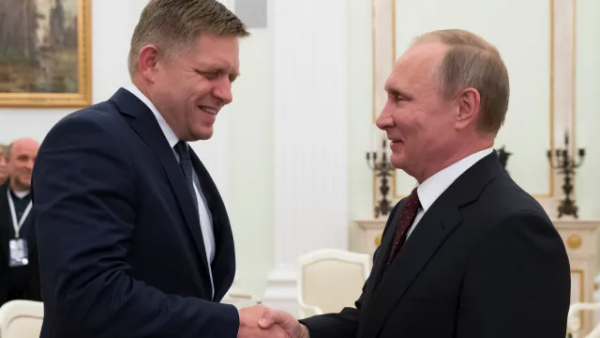File: Slovakia’s PM Robert Fico is shown in a file photo with Russia’s Vladimir Putin . The shooting of Fico quickly turned the spotlight on the inflammatory politics that have become so prevalent in Europe since the coronavirus pandemic and turbocharged by Russia’s war on Ukraine.
BY ANDREA DUDIK AND DANIEL HORNAK
BLOOMBERG
Robert Fico was just doing what he usually does, especially in a part of the country that voted for him. But minutes after Slovakia’s prime minister emerged from a meeting to mingle with supporters in the town of Handlova, he was being rushed to the hospital with bullet wounds.
The attempted assassination by a 71-year-old pensioner and poet has left the country in shock. It also quickly turned the spotlight on the inflammatory politics that have become so prevalent in Europe since the coronavirus pandemic and turbocharged by Russia’s war on Ukraine.
The Russia-friendly Fico, 59, returned to power last year with promises such as increasing state handouts and halting arms shipments to Ukraine. Like nationalist Hungarian ally Viktor Orban next door, he sought to exploit divisions over LGBTQ rights, gender issues and immigrants — and depict the European Union and NGOs as enemies of the state.
That divide-and-conquer strategy has left Slovakia more polarized than ever 20 years since joining the European Union, and coming to terms with the first assassination attempt on a European leader since before then.
As the premier was being transported to surgery, his allies moved to blame the opposition and the “liberal” media for having blood on their hands. Andrej Danko, leader of the Slovak National Party that governs in coalition with Fico, vowed “to start a political war.”
Zuzana Caputova, the outgoing president and an opponent Fico has branded as an “American agent,” called for calm. “Hate speech and rhetoric full of hate — which we witness across society — leads to hateful acts,” a visibly shaken Caputova told reporters. “Please, let’s stop that.”
Fico was shot multiple times as he headed to meet people in Handlova after his government held a meeting at the cultural center in the town. He had to undergo surgery lasting several hours, with officials saying that he was in critical condition at the hospital as of late Wednesday evening.
Deputy Prime Minister Tomas Taraba was later cited by BBC as saying that Fico’s procedure appeared to have gone well and that he was out of immediate danger.
“I guess in the end, he will survive,” Taraba told BBC. “He’s not in a life threatening situation at this moment.”
It was the first incident of its kind in Europe since Serbian premier Zoran Djindjic was shot dead in 2003 in Belgrade. It also had echoes of the killing of Swedish Prime Minister Olof Palme, gunned down in Stockholm in 1986.
“What happened today is a scar that will be impossible to overcome, one that will haunt us for many years,” Defense Minister Robert Kalinak, one of the closest friends and allies of Fico for decades, told reporters.
The shooting has rocked Slovakia, a country of 5.4 million people, and especially because it happened in Handlova, a stronghold for Fico and his Smer party. It took 33% of the vote in the Sept. 30 election, almost twice that of its nearest rival.
The mining town of 16,000 has suffered economically from the transformation that followed the end of communism in 1989. Over the years, voters have embraced Fico’s simple, populist and worker-oriented rhetoric.
But he also created enemies. Interior Minister Matus Sutaj-Estok said that the assassination attempt was politically motivated. The gunman was identified as Juraj C. from the Slovak town of Levice, and the police also believe he had a “clear” political motive.

The suspect, who is believed to be 71, was a “lone wolf” who did not belong to any political party . An initial investigation found “a clear political motivation” behind the assassination attempt, Interior Minister Matus Sutaj Estok said as he briefed reporters alongside the defense minister.
The shooter waited for Fico to arrive after the government meeting. “Robo, come here,” he shouted, calling the premier by the colloquial form of his first name, according to local media reports. Then he fired.
While such an attack on a politician in Slovakia is unprecedented, the country has seen high-profile gun violence before — and relatively recently. Fico was ousted after the gangland-style killing of an investigative journalist, who reported on corruption, and his fiancee, in 2018.
Political comeback
Yet he reinvented himself and rebuilt popularity by becoming the anti-voice on contentious issues like COVID-19 vaccines and the EU’s migration policies. His stance on Ukraine then further polarized Slovakia and put the country at odds with Western partners.
Some 41% of Slovaks believe Russia isn’t the aggressor while people have increasingly turned to conspiracy theories. Moscow’s propaganda has been in overdrive while diplomats stationed in Bratislava have slammed Fico’s party for repeatedly spreading misinformation about the Russian invasion.
Since he came back to power, Fico lashed out at the country’s media for criticizing the government and boycotted outlets he viewed as “hostile.” His government tightened controls over public television and radio, an Orban-style move that drew a rebuke from the EU.
The Slovak Parliament’s deputy speaker, Peter Ziga, said the attack on Fico was the result of “whipped up passions and the division of Slovak society into two irreconcilable camps.”
Indeed, Fico also spoke of Slovakia’s deep division following a presidential election last month that saw his ally become head of state. He even talked of a potential attack against a government official. Less than a month later, he was fighting for his life.
Japan Times , Bloomberg


Leave a Reply
You must be logged in to post a comment.